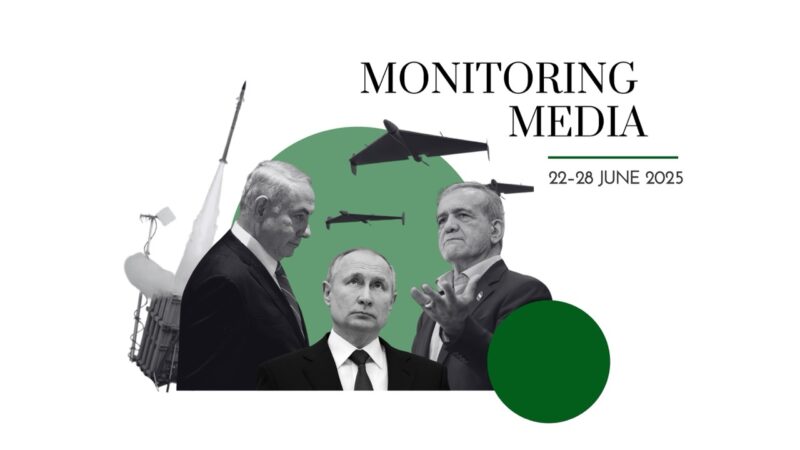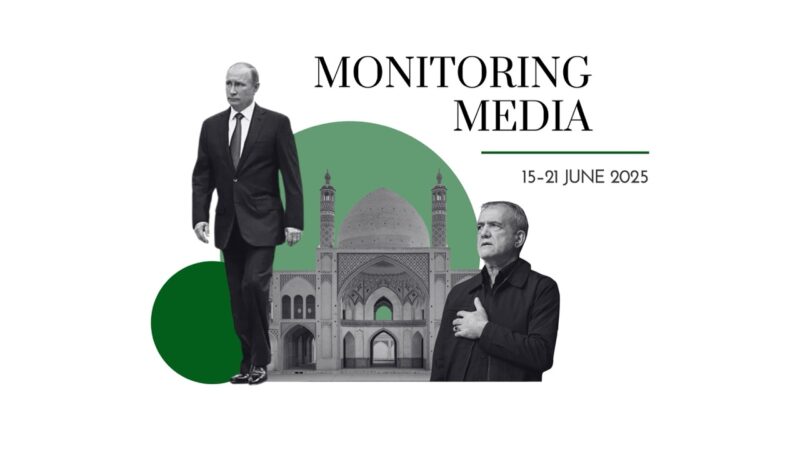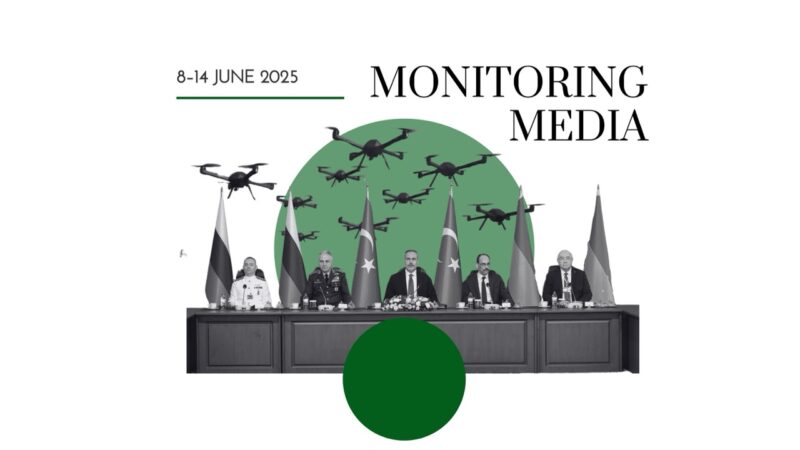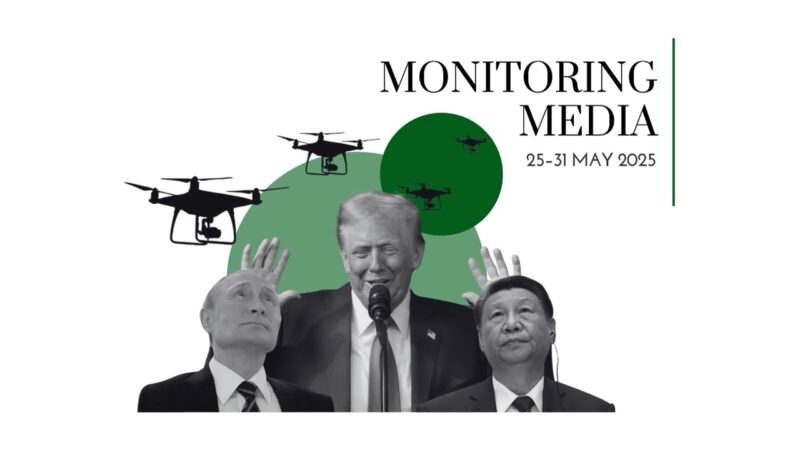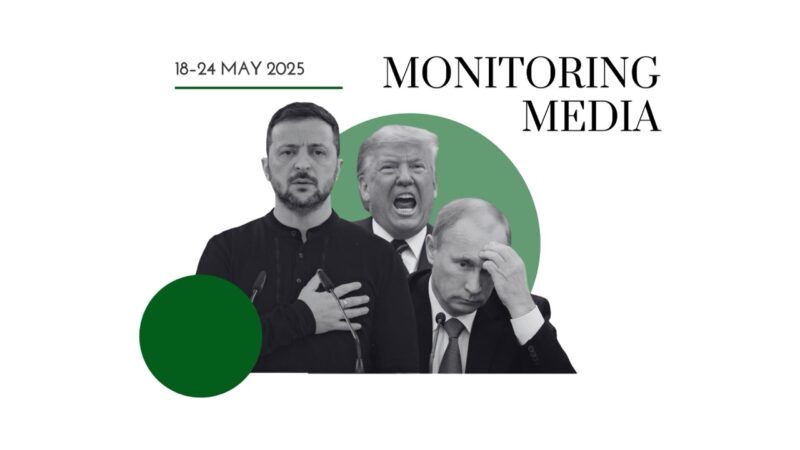Ukraine may be granted fast-track NATO membership

CIUS weekly report on North American media coverage of Ukrainian affairs, 10–16 June 2023
Three publications (Atlantic Council, Politico, and The National Interest) were selected to prepare this report on how the situation in Ukraine has been portrayed in the North American press during the past week (10–16 June 2023). The sample was compiled based on their impact on public opinion as well as on their professional reputation, popularity among the readership, and topical relevance. These three publications represent centrist and conservative viewpoints on the political spectrum.
This report covers only the most-read and relevant articles about Ukraine, as ranked by the respective North American publications themselves in the past week. Its scope covers promoted articles on home pages and articles from special sections on Ukraine, with the hashtag #Ukraine, from the paper editions of the publications, and about Ukraine from opinion columns and editorials.
Topics featured in the selected articles:
- Ukraine’s current affairs: Ukrainian society is ready for a long war with Russia; reintegration of liberated territories will be a challenging task for the Kyiv government;
- The world and Ukraine: the West is discussing security guarantees to Ukraine, including fast-track NATO membership; the West is drastically expanding its military-industrial complex; the US should have no problems supporting Ukraine and Taiwan simultaneously;
- Russia at war: Putin’s incompetence is speeding up the defeat of Russia in Ukraine; Russian society will become more secure and prosperous after Ukraine joins NATO.
Main arguments:
Ukrainians are ready to fight Russian occupiers as long as it takes. Peter Dickinson (Atlantic Council) presents the result of a public opinion poll conducted in late May and early June by the Kyiv International Institute of Sociology (KIIS). According to that poll, 84 percent of Ukrainians oppose making any territorial concessions to Russia, even if this means prolonging the war. Dickinson argues that such a result “illustrates the unifying impact that the Russian invasion has had on Ukrainian public opinion, and underlines the significance of the ongoing war as a major milestone in modern Ukraine’s nation-building journey.” There are no longer clear divisions between the southeastern and western parts of the country; both support Euro-Atlantic integration and disregard pro-Russian sentiment. Moreover, such overwhelming support for the territorial integrity of Ukraine is a powerful message sent by the society to the government, army, and international allies in the first weeks of the counteroffensive: “As long as Ukrainians remain determined to fight on, few Western leaders will be prepared to abandon them.” According to Dickinson, the major reason for the readiness of Ukrainians to fight as long as it takes resides in their desire to neutralize “the genocidal agenda underpinning Russia’s invasion” and prevent “the horrors taking place in Russian-occupied regions.” Apart from that, Ukrainians have lost all their trust in Russians and believe that “attempts to strike a bargain with the Kremlin are both futile and dangerous.” Dickinson concludes: “For centuries, Russian imperial influence has shaped Ukrainian history in ways that have caused untold suffering to generations of Ukrainians while keeping the country trapped in a state of arrested development. Unless Russia is defeated and forced to withdraw entirely from Ukrainian land, this bitter cycle will continue.”
Ukraine will need to undertake the complex task of reintegrating liberated communities after the counteroffensive is over. Lesia Dubenko (Atlantic Council) claims that “if the Ukrainian Armed Forces are able to achieve significant advances, the authorities in Kyiv will also be faced with the challenge of reintegrating communities that have lived for more than a year, and in some cases over nine years, under Russian occupation.” One of the major challenges for the successful reintegration will reside in the necessity to break Russia’s control over the informational space and discredit popular beliefs spread by foreign propaganda. They include the belief that contemporary Ukraine became a Nazi state and a puppet of the West while its true future should lie with a brotherly Russian people. Dubenko argues that much to the surprise of Kremlin strategists, the Ukrainian national identity has proven to be far stronger than they anticipated. The fact that millions of Ukrainians use the Russian language in their daily communication and are not foreign to Russian culture does not mean that they are automatically Putin’s loyalists. A brand-new generation of Russian-speaking Ukrainians has grown up since 1991. Apart from that, Ukrainians seem to have developed a resilience against Russian messages; regardless of being subjected to many decades of Russification, “the past nine years of Russian aggression have sparked a sharp rise in Ukrainian patriotism across the country, particularly in regions previously regarded as being highly russified.” To facilitate reintegration, Dubenko suggests making stories of the victims of Russian aggression known to the public (i.e., local residents are a much more credible source of information than the government). Also, Ukrainian messages should be communicated in Russian to reach those people who have long-lost connection to their homeland. Dubenko concludes: “In order to win hearts and minds, it is vital to underline to liberated communities that they are coming home to a nation that values and embraces them.”
The West is working on introducing Ukraine into its security architecture. Alexander Ward, Joe Gould and Paul McLeary (Politico) write that the US and its partners will negotiate security guarantees for Ukraine on the eve of the forthcoming NATO summit in Vilnius (11–12 July 2023). These guarantees may become the first step towards Ukraine’s full-fledged membership in the Alliance. Based on declarations of American and European officials, Ward, Gould, and McLeary state that “the U.S., Britain, France and Germany—known as the ‘European Quad’—would in essence formalize their military and economic support for Ukraine, keeping it flowing even after the fighting with Russia ends.” At the same time, no amount of military or economic support on a bilateral or multilateral basis would provide as solid a security guarantee as NATO membership. The authors argue that negotiating the conditions for any collaboration with Ukraine is a challenging task for Western governments. Some officials posit that any temporary solutions are pointless and Ukraine should be provided with a NATO membership plan (which is unlikely to happen while the country is at war). Other officials opine that new mechanisms, such as a Ukraine-NATO Council, may be a solution, because they will give “Kyiv the authority to call for alliance meetings and [allow] for more intelligence sharing.” At the very end, Ward, Gould, and McLeary cite Ben Friedman, a policy director at the restraint-oriented Defense Priorities think tank, who claims that “Security guarantees for Ukraine, it seems to me, would never be credible, since we have refused to fight directly for Ukraine in its time of greatest peril… Why would that change later just because of a paper promise?”
Alexander Ward and Lili Bayer (Politico) assess the likelihood of Ukraine receiving an official invitation to join NATO and argue that it has been increasing: “The proposal [may become] official during a major gathering next month.” Ward and Bayer are refering to the private suggestions of Jens Stoltenberg, NATO Secretary General, regarding Ukraine joining the Alliance after the war “without following a Membership Action Plan (MAP), which is a series of military and democratic reforms that an applicant nation must make before accession.” This suggestion contradicts Kyiv’s desire to join NATO right away, but makes the membership a realistic goal in the future. The authors note that Stoltenberg’s suggestion resonates positively among many key NATO members. At the same time, “some southern Europeans fear that removing the MAP barrier would further anger Russia, potentially escalate the war, and make rebuilding ties with Moscow after the war harder… There’s also the problem of Hungary and Turkey, which are ‘uncomfortable’ with inching Ukraine along the membership path.” Ward and Bayer conclude that binding provisions on Ukraine’s membership process will be drawn only after the war with Russia is over. At that point, an assessment will be made of Ukraine’s sovereignty and of the government in Kyiv. “The country would still have to initiate serious democratic reforms, including ridding Ukraine of the corruption that has plagued its government for decades.”
The West acknowledges and tries to deal with deficits in its security sector. Paul McLeary, Lili Bayer, and Lara Seligman (Politico) write that Ukraine’s Western allies are expected to sign off on a new defence production plan next month, but concerns have emerged about the aggregate output of their military-industrial complexes: “The need to supply and sustain Ukraine will remain for years, especially if Ukraine joins NATO. At the same time, individual governments are scrambling to increase funding for their own defense industries, to ramp up production, and work through supply chain bottlenecks that remain from decades of neglect.” The Russo-Ukrainian war has demonstrated to Western governments that high-intensity fighting has not disappeared from 21st-century battlefields. Ammunition and equipment in such fighting are expended extremely fast. Moreover, while at the very beginning of the Russian invasion Ukraine was provided with rather unsophisticated weaponry, today “Ukrainian pilots are preparing to learn how to fly F-16s, drive main battle tanks and operate state-of-the-art long-range munitions and air defenses.” With this in mind, the NATO leaders are expected to sign off on a new Defense Production Action Plan when they meet in Vilnius (Lithuania) on 11–12 July. According to the authors, EU leaders have not looked as serious and concerned about the security of their countries since the 1990s. They are also willing to continue supporting Ukraine’s defence efforts: “Germany and Poland made commitments to sustain the Leopard tanks rushed to Ukraine this spring, while the U.S., U.K., Denmark, the Netherlands, and Canada pledged new shipments of air defense missiles. Norway and Germany also announced multiyear security assistance packages, and Denmark pledged nearly $2.6 billion in military assistance for Ukraine through 2024.” These commitments come on top of the $325-million assistance package promised by the US in mid-June.
The US should not scrimp on Ukraine in order to help Taiwan more. Robert Nelson (The National Interest) argues that boosting the defences of Taiwan in light of probable Chinese aggression at the expense of US support for Ukraine has many valid political points to it, yet geopolitically “is highly unsound.” There are many reasons for that. Primarily, “the [US] defense budget does not solely consist of spending on Ukraine and Taiwan. Many other programs, some arguably wasteful, could be reduced or eliminated to increase funding for Taiwan’s defense.” Secondly, because Russia is a Chinese ally, Beijing would likely obtain military equipment from there if the conflict around Taiwan aggravated. Therefore, the more Russian equipment Ukraine destroys today, the safer the future of the Western Pacific region will be. Thirdly, if Ukraine succeeds in defeating Russia, Putin’s regime will likely fail. The new leader in the Kremlin may be more oriented toward Washington and less toward Beijing, which is a tempting security gamble for the US. Fourthly, the war in Ukraine is being fought on land, while an aggravated conflict around Taiwan will likely take place on the sea. The two require different types of military equipment, drawn from different stockpiles. Thus, there is no point in sending fewer arms to Ukraine. Fifthly, by supporting Ukraine today the US gets to test new solutions in cyber-security and logistics, which could be crucial if a hot conflict erupts in the Western Pacific. Sixthly, US support of Ukraine will not encourage China to use its chance and advance toward Taiwan. If the latter happens, the EU member-states will also become more hostile toward Beijing and form a unified pan-Western coalition against it. Chinese long-term interests and stability would significantly suffer. Finally, unlike the Russo-Ukrainian war, military escalation around Taiwan would directly involve two nuclear powers, and the risks of missile strikes and destruction are much higher. Nelson concludes that “U.S. national security officials must recognize tradeoffs, but it is equally true that they must also recognize false tradeoffs when they emerge. The idea that Washington must choose between defending Taiwan and defending Ukraine is one such false choice, and the Biden administration is wise to ignore such criticisms.”
Inadequacy of the Kremlin’s leadership increasing the chances of Russia’s defeat in Ukraine. Anders Åslund (Atlantic Council) opens his essay by stating that “Vladimir Putin’s disastrous invasion of Ukraine is exposing all of his personal weaknesses as a ruler. It is also casting an unforgiving light on the extensive damage he has done to Russia.” Åslund briefly describes his short encounters with young Putin in the 1990s, and claims that he was known then as a loyal KGB agent who used to hide “on the sidelines [of international meetings] and did not really talk to anybody.” Putin’s quick ascent to power was owed to his connections with a handful of people who were close to Boris Yeltsin. Having become the President, Putin reaped the fruits of the reforms introduced earlier by Yeltsin and his team, not to mention benefited from rising global oil prices. During the last twenty years Putin has been building an inefficient and flawed regime that is slowly crumbling today under the burden of the war with Ukraine. First, the circle of Putin’s advisors—his former KGB colleagues and old technocrats—has never changed for years; it lacks innovative thinking and favours conspiracy theories. Second, Putin does not trust anyone but his own intelligence agencies; he likes hearing good news and prefers remaining under-informed to knowing all the truth. Third, Putin “has never been a fast decision maker or crisis manager,” which can be observed today in his delayed and inadequate war decisions. Fourth, Putin prefers loyalty to professionalism and centralization of government to delegation of powers: “Incompetent senior officials are forgiven for their frequent blunders as long as they remain personally loyal to Putin.” Russian generals who drown their army in corruption and launched a disastrous military campaign are allowed to continue doing so. Åslund concludes that “with the invasion of Ukraine now in its sixteenth month, Putin’s limitations as a leader have left Russia heading for an historic defeat.”
Russian society would benefit from Ukraine joining NATO. Leonid Gozman (Atlantic Council) argues that Putin’s desire to prevent Ukraine joining NATO is not only failing as the reason behind the invasion, but it also has gone against Russia’s national interest: “No NATO member has ever threatened to attack Russia. On the contrary, Russia’s shared borders with NATO have always been strikingly calm and secure.” Therefore, with Ukraine joining the alliance, Russia’s western border would be significantly strengthened. Apart from that, with Ukraine in NATO Kremlin strategists would have fewer options to start a new war of aggression in Europe—which, in turn, would save the lives of ordinary Russians. Finally, with Ukraine’s entrenchment in the Western security architecture, all political incentives to restore the Russian Empire will be put on hold. The latter development is actually favourable for ordinary Russians, who would be freed from the “crushing economic and moral burdens that [stem from imperialism and] hamper the development of a country and lead to stagnation.” Gozman highlights that unlike Putin, the majority of Russians seem to be neutral or critical of imperial ambitions. They can also be inspired by Ukraine’s example of reforms. If that happens, Russians will engage more actively in productive individual economic activity and thereby strengthen democratic institutions—political developments that Putin considers inappropriate for his vision of Russia. Gozman concludes that if Russia is not defeated in Ukraine today, it will reignite the war in future: “Just as lasting peace was only possible after World War II due to the removal of the Nazi system, future peace in Eastern Europe will depend on the end of the Putin regime. This is clearly in the interests of the Russian people, and will be much more likely if Ukraine joins NATO.”
